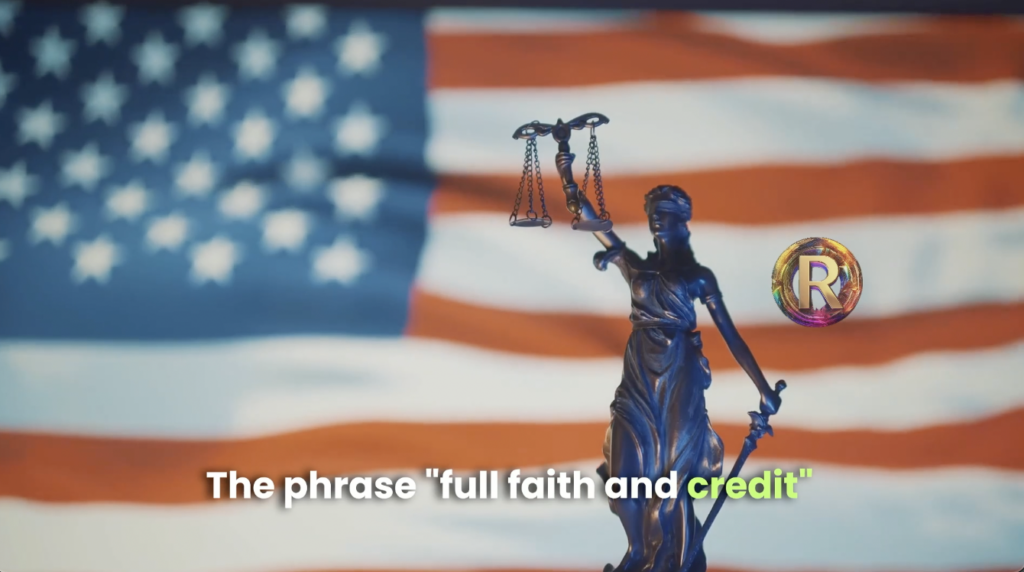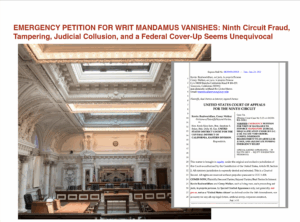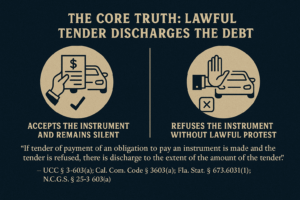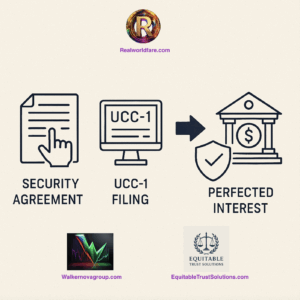Uncover how the principle of full faith and credit positions you as the true creditor behind the financial system. Dive into essential legal foundations such as the U.S. Constitution, 18 U.S.C. § 8, 31 U.S.C. § 5118, and the Gold Reserve Act of 1934, exposing how your trust and credit back all public obligations. Understand how the U.S. operates as a commercial entity under the Clearfield Doctrine, and how debts are lawfully discharged through the U.S. Treasury. Empower yourself with this knowledge and reclaim your rightful position within the system.
The phrase full faith and credit originates from Article IV, Section 1 of the U.S. Constitution, which states:
“Full Faith and Credit shall be given in each State to the public Acts, Records, and judicial Proceedings of every other State. And the Congress may by general Laws prescribe the Manner in which such Acts, Records and Proceedings shall be proved, and the Effect thereof.”
While this applies directly to the recognition of state laws and judicial decisions, the broader principle extends to financial obligations—the foundation of the nation’s entire credit system.
Every dollar, every financial transaction, every government bond is backed by your productivity, your labor, and your collective credit. The government itself was created by the people and derives its legitimacy from you.
The Declaration of Independence and the Preamble to the U.S. Constitution confirm this:
“We the People of the United States, in Order to form a more perfect Union, establish Justice, insure domestic Tranquility, provide for the common defence, promote the general Welfare, and secure the Blessings of Liberty to ourselves and our Posterity, do ordain and establish this Constitution for the United States of America.”
This means the government is nothing more than a trust—an entity serving the interests of the people, not the other way around.
Now, let’s talk about something the government won’t tell you—18 U.S.C. § 8. This federal statute defines obligation or other security of the United States to include Federal Reserve notes, bonds, and financial instruments. Meaning? Every financial obligation—public or private—is ultimately backed by the U.S. Treasury.
This aligns with House Joint Resolution 192 of 1933, which removed the gold standard and ensured debts would be discharged dollar for dollar in legal tender. Since there’s no real money—only credit—the system operates entirely on your trust and confidence.
And that’s reinforced by 31 U.S.C. § 5118, which states:
“The United States Government may not pay out any gold coin. A person lawfully holding United States coins and currency may not demand payment in gold coin.”
This law effectively means that all payments are made in legal tender, and there is no lawful way to demand a payment in substance—only in the credit-based system of Federal Reserve notes.
The Gold Reserve Act of 1934, Public Law 73-87, Title III, Section 3, further solidifies this principle by explicitly outlawing any obligation that requires payment in gold or a specific currency. It states:
“(a) Every provision contained in or made with respect to any obligation which purports to give the obligee a right to require payment in gold or a particular kind of coin or currency of the United States, or in an amount in money of the United States measured thereby, is declared to be against public policy.
(b) Every obligation, heretofore or hereafter incurred, shall be discharged upon payment, dollar for dollar, in any coin or currency which at the time of payment is legal tender for public and private debts.”
In Clearfield Trust Co. v. United States (1943), the Supreme Court ruled that when the government engages in commerce, it acts as a private corporation—not a sovereign power. That means when the U.S. deals in financial matters, it is bound by contract law and commercial regulations, just like any other corporate entity.
So, what does this mean for you?
It means that when the government imposes financial obligations or engages in commerce (courts, tickets, foreclosure proceedings, evictions, unlawful detainers, mortgages, auto loans, personal loans, you name it….
it’s doing so as a commercial player—not as an untouchable sovereign force.
Let’s bring this all together. Each American has full faith and credit because the government itself is a creation of the people. Its financial obligations are legally and commercially tied to you as the creditor. The U.S. Treasury ensures all debts are discharged, 31 U.S.C. § 5118 confirms there is no payment in gold, the Gold Reserve Act of 1934 makes it illegal to demand payment in a specific form of currency, and under the Clearfield Doctrine, the government functions as a corporate entity when engaging in commerce.
Knowledge is power. When you understand these principles, you take back control. You are not a debtor—you are the creditor. And the system is built on your full faith and credit.
Want to learn more about how to use this knowledge in your daily life? Like, subscribe, and stay tuned for more eye-opening episodes. Until next time—stay informed, stay empowered, and remember: you are the system, you power the system, and ignorance of the law is no excuse.




